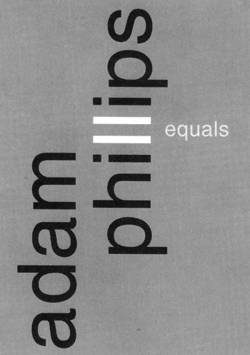 Equals
Equals
Adam Phillips
New York: Basic Books, 2002
272 pp.; $25.00 (cloth)
Perhaps you have experienced the profound shock—or the mild amusement—that comes from finding yourself in a therapist’s office, eager to start working on your past, and with a bit of luck, your future, only to discover that the other person in the room is deeply attached to the idea that there is just one analyst present. Adam Phillips once wrote a whole book about this—the carefully titled volume Terrors and Experts—and it is a theme to which he returns with new force here. Phillips places the problem of politics more centrally than ever before; and he does so in a manner that is deeply pertinent to the theory and practice of Buddhism.
The central problem concerns the interrelation between two issues. In the first place, “We are, like all creatures, creatures who want; and yet, for some reason we are unable to dispense with the idea of justice.” Second, in our desire for happiness and justice, we have invented psychotherapy—a practice that involves two desiring creatures, and raises the problem of identifying which of these is the “expert.”
If Mark Epstein (in Thoughts Without a Thinker and other works) has already explored this territory, Phillips wants to question the map. His passages on the therapist-patient dynamic will remind many Buddhist readers of the debate concerning teachers of the dharma. By whose authority does a teacher teach? How is the teacher to know the truth concerning the authenticity of a student’s experience? Phillips asks the same questions of the analyst.
And he considers the essence of democratic values when making this rhetorical plea: “Isn’t it, after all, one of the aims of at least some versions of psychoanalysis to transform enemies into adversaries; to free a person to be at odds with himself (and others) rather than in lethal combat?” Thus, without some form of introspective personal inquiry, democracy is always likely to be tainted by neurosis and compulsion. “The aim of psychoanalysis, one could say, might be the precondition for democracy; that a person be able to more than bear conflict, and be able to see and enjoy the value of differing voices and alternative positions.” Replace the word psychoanalysis with meditation and you have a very interesting sentence. Consider its pertinence to the goal of nonattachment to views, and it really comes alive.
What binds the Phillips version of psychoanalysis to Buddhism is its eager embrace of no-self. Phillips is the author of a biography about the British psychoanalyst D. W. Winnicott, whose work has been a touchstone in his writing ever since Phillips’s brilliant essay collection On Kissing, Tickling and Being Bored. And this approach, which also draws on the work of French psychoanalyst Jacques Lacan, is very different from the pop psychology school of thought that urges us to get in touch with our feelings. Using the work of Emmanuel Ghent, Phillips explores a “proliferating self”—one that offers not “truths or beliefs” but “a continually evolving project.”
“To grow up is to discover what one is unequal to.” Delivered with the brevity of a Zen koan, this comment reads more like poetry than prose. And it is surely a problem that—for reasons having to do with evolution, and with our existential plight (to cite the explanations often given by Stephen Batchelor), and perhaps also for reasons having to do with consumerist modernity—this piece of ego deflation is, to put it mildly, extremely difficult to accomplish. The world will teach us this lesson, one way or another, but in the meantime Phillips insists that psychoanalysis is not about the construction of ego states, but about knowing that they are already illusory. He does not forge the link with Buddhism that is crying out to be made, but—to play Phillips at his own oblique game—that does not mean it isn’t there.
Throughout Equals, Adam Phillips shares his love of paradox, a notion that is surely at the very heart of the Buddhist journey. If he sometimes gets carried away with it (I wondered whether his comment on Bertrand Russell—“Intelligence is the last refuge of the emotionally deprived”—might be an autocritique), paradox is nonetheless a place from which great wisdom emerges. “It is to what is being taken when we take care of another person that Freud drew our attention,” he writes. The vital link between Buddhism and psychoanalysis has rarely been so beautifully put, and never with such outrageous simplicity.